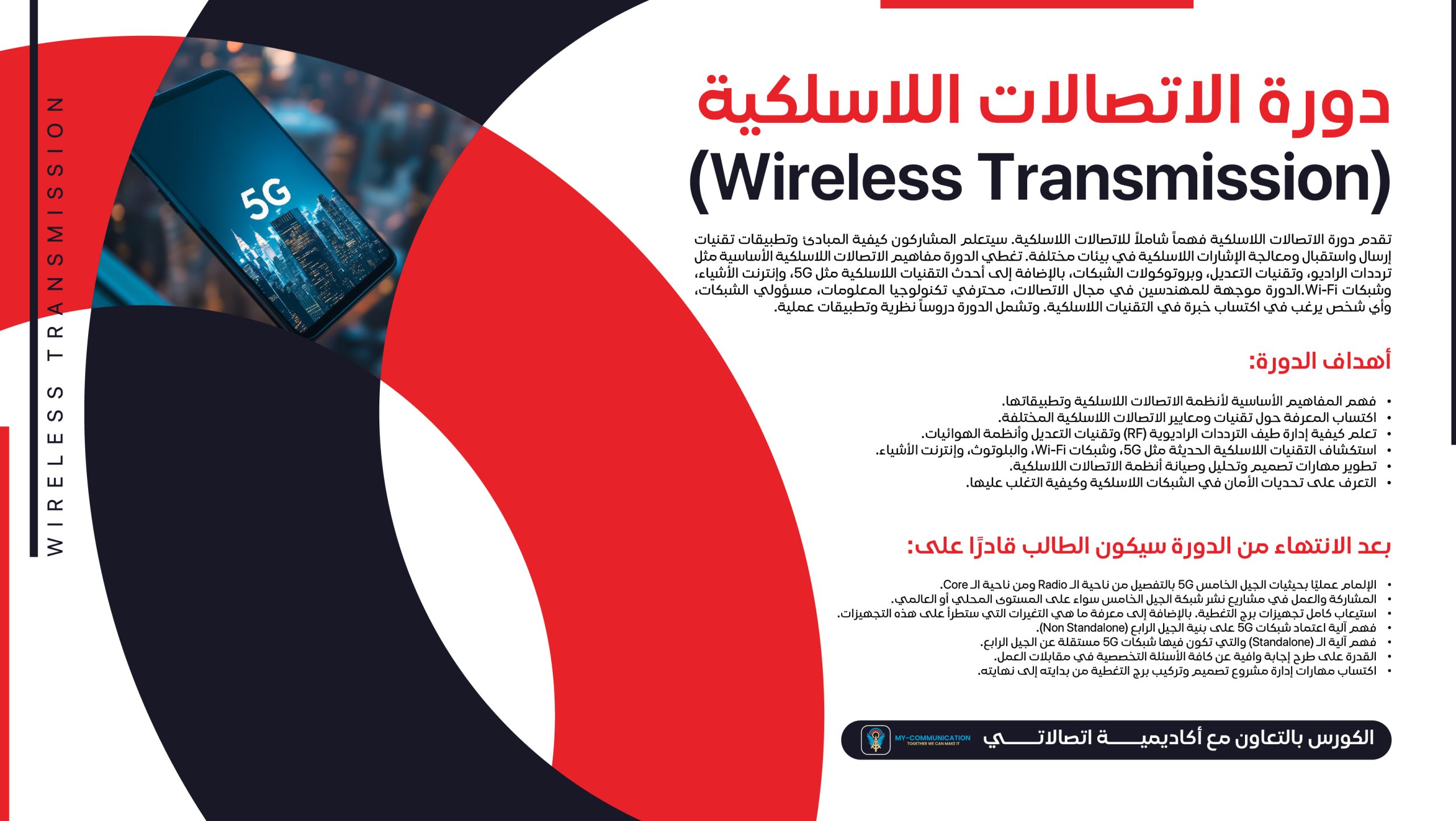Wireless Transmission Course Overview:
The Wireless Transmission Course offers an in-depth exploration of the principles, technologies, and applications of wireless communication systems. Participants will gain a comprehensive understanding of how wireless signals are transmitted, received, and processed across various environments. This course covers essential concepts in wireless communication, including radio frequencies, modulation techniques, network protocols, and the latest advancements in wireless technologies such as 5G, IoT, and Wi-Fi.
Designed for telecommunications engineers, IT professionals, network administrators, and anyone looking to build expertise in wireless technologies, the course includes both theoretical lessons and hands-on practical applications.
Course Objectives:
- Understand the fundamental concepts of wireless communication systems and their applications.
- Gain knowledge about different wireless transmission technologies and standards.
- Learn about radio frequency (RF) spectrum management, signal modulation, and antenna systems.
- Explore modern wireless technologies, including 5G, Wi-Fi, Bluetooth, and IoT networks.
- Develop skills to design, analyze, and troubleshoot wireless communication systems.
- Familiarize participants with the security challenges in wireless networks and methods to mitigate them.
Training Content:
- Introduction to Wireless Communication:
- Overview of wireless communication history and evolution.
- Key principles of wireless transmission.
- Comparison between wired and wireless networks.
- Radio Frequency (RF) and Spectrum Management:
- Understanding RF spectrum, frequencies, and bandwidth.
- Spectrum allocation and regulation.
- Signal propagation, fading, and interference in wireless communication.
- Modulation and Signal Processing:
- Digital and analog modulation techniques (AM, FM, QAM, etc.).
- Understanding spread spectrum and multiplexing.
- Signal processing methods in wireless transmission.
- Wireless Transmission Technologies:
- Overview of different wireless technologies (GSM, CDMA, LTE, 5G).
- Wi-Fi standards and protocols (802.11x).
- Bluetooth and Zigbee technologies for short-range communication.
- IoT communication protocols.
- Wireless Networks Architecture:
- Wireless network topologies (Ad-hoc, Infrastructure, Mesh).
- Mobile network architecture and components (base stations, towers, etc.).
- Understanding cellular networks and handover mechanisms.
- Antenna Systems and Wireless Signal Transmission:
- Types of antennas and their functions.
- Signal propagation models.
- Design considerations for wireless networks.
- Security in Wireless Networks:
- Common threats in wireless communication.
- Encryption and security protocols (WPA2, WPA3).
- Techniques for securing wireless transmission.
- Emerging Wireless Technologies:
- Introduction to 5G technology and its impact on communication.
- IoT and its applications in smart cities, healthcare, and automation.
- Future trends in wireless communication.
- Practical Applications and Troubleshooting:
- Hands-on exercises in setting up and configuring wireless networks.
- Analyzing signal strength, interference, and network performance.
- Troubleshooting common wireless network issues.
- Final Project:
- Participants will work on a project that involves designing and implementing a wireless network solution.
Target Audience:
- Telecommunications engineers and professionals.
- IT and network administrators.
- Electronics and communication engineering students.
- Technicians involved in wireless network setup and maintenance.
- Individuals interested in building a career in wireless communication technologies.
- Security professionals focused on wireless network protection.
This course is ideal for both beginners seeking foundational knowledge in wireless communication and professionals aiming to deepen their expertise in advanced wireless technologies.






